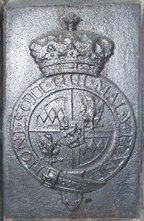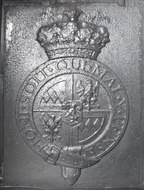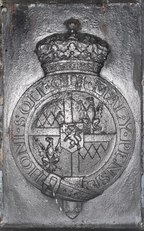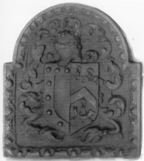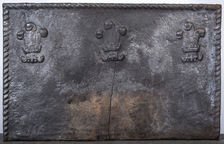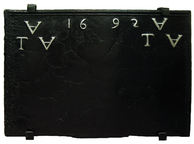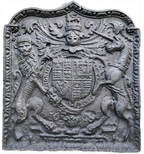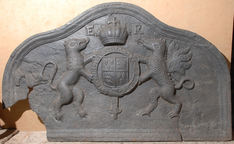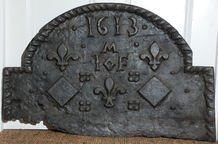-
1216
Description: Rectangular shape; no edging; shield of the 2nd Duke of Montagu surrounded by the Garter and surmounted by a ducal coronet.
Notes: One of six firebacks at Boughton House, Northamptonshire, cast with the ducal arms and the Garter having a diameter of 40cm. Fifty firebacks were cast for the house between 1743 and 1748 by Richard Ford, probably at Newland Furnace, but also possibly at Nibthwaite furnace, both then in north Lancashire. The arms are blazoned: Quarterly, 1st & 4th: Argent, three fusils conjoined in fess gules, a bordure sable (Montagu); 2nd & 3rd: Or an eagle displayed vert beaked and membered gules (Monthermer); on an escutcheon of pretence, Sable a lion rampant Argent a canton Argent charged with a cross Gules (Churchill); John, 2nd Duke of Montagu married Mary, daughter and co-heiress of John, 1st Duke of Marlborough.
Copies of this fireback are known.
Inscription: HONI.SOIT.QUI.MAL.Y.PENSE
Arms: Montagu quartering Monthermer with Churchill in an escutcheon of pretence - John Montagu, 2nd Duke of Montagu, KG
- Decoration tags:
- rectangular (shape)
- none (edging)
- whole carved pattern
Manufactured: in the mid-18th century probably at Newland Furnace in the Furness area of England.
Current location: Boughton House, Geddington, Northamptonshire, England.
- Attached to series:
- Montagu arms series
- Personal armorial firebacks
-
1217
Description: Rectangular shape; no edging; shield of the 2nd Duke of Montagu surrounded by the Garter and surmounted by a ducal coronet.
Notes: One of 23 firebacks at Boughton House, Northamptonshire, cast with the ducal arms and the Garter having a diameter of 48cm. Fifty firebacks were cast for the house between 1743 and 1748 by Richard Ford, probably at Newland Furnace, but also possibly at Nibthwaite furnace, both then in north Lancashire. The arms are blazoned: Quarterly, 1st & 4th: Argent, three fusils conjoined in fess gules, a bordure sable (Montagu); 2nd & 3rd: Or an eagle displayed vert beaked and membered gules (Monthermer); on an escutcheon of pretence, Sable a lion rampant Argent a canton Argent charged with a cross Gules (Churchill); John, 2nd Duke of Montagu married Mary, daughter and co-heiress of John, 1st Duke of Marlborough.
Copies of this fireback are known.
Inscription: HONI.SOIT.QUI.MAL.Y.PENSE
Arms: Montagu quartering Monthermer with Churchill in an escutcheon of pretence - John Montagu, 2nd Duke of Montagu, KG
- Decoration tags:
- rectangular (shape)
- none (edging)
- carved pattern panels
- heraldic
- armorial
- text
Manufactured: in the mid-18th century probably at Newland Furnace in the Furness area of England.
Current location: Boughton House, Geddington, Northamptonshire, England.
- Attached to series:
- Montagu arms series
- Personal armorial firebacks
-
1218
Description: Rectangular shape; no edging; shield of the 2nd Duke of Montagu surrounded by the Garter and surmounted by a ducal coronet.
Notes: One of five firebacks at Boughton House, Northamptonshire, cast with the ducal arms and the Garter having a diameter of 59cm. Fifty firebacks were cast for the house between 1743 and 1748 by Richard Ford, probably at Newland Furnace, but also possibly at Nibthwaite furnace, both then in north Lancashire. The arms are blazoned: Quarterly, 1st & 4th: Argent, three fusils conjoined in fess gules, a bordure sable (Montagu); 2nd & 3rd: Or an eagle displayed vert beaked and membered gules (Monthermer); on an escutcheon of pretence, Sable a lion rampant Argent a canton Argent charged with a cross Gules (Churchill); John, 2nd Duke of Montagu married Mary, daughter and co-heiress of John, 1st Duke of Marlborough.
Copies of this fireback are known.
Inscription: HONI.SOIT.QUI.MAL.Y.PENSE
Arms: Montagu quartering Monthermer with Churchill in an escutcheon of pretence - John Montagu, 2nd Duke of Montagu, KG
- Decoration tags:
- rectangular (shape)
- none (edging)
- carved pattern panels
- heraldic
- armorial
- text
Manufactured: in the mid-18th century probably at Newland Furnace in the Furness area of England.
Current location: Boughton House, Geddington, Northamptonshire, England.
- Attached to series:
- Montagu arms series
- Personal armorial firebacks
-
898
Description: Arched rectangular; ovolo-moulded egg and dart edging; shield surmounted by helm and indistinct crest, with elaborate mantling.
Notes: Blazon (bordure bezanty impaling a chevron between three bugle horns) is unidentified. The date of c.1730 suggested by Gentle and Feild is unlikely to be correct.
Arms: Not known
- Decoration tags:
- rectangular with round arch (shape)
- ovolo, egg and dart (edging)
- whole carved pattern
- armorial
Manufactured: in the early- to mid-17th century in England.
Current location: not known.
- Attached to series:
- Personal armorial firebacks
-
1019
Description: Rectangular; twisted rope edging; top centre and corners, stamp formed of three ostrich feathers within a coronet, repeated three times.
Notes: The ostrich feathers are the badge of the Prince of Wales; a recast plate. Gildings Auctioneers, Market Harborough, 19 Apr 2016 lot 529.
- Decoration tags:
- rectangular (shape)
- rope (edging)
- carved stamps
- heraldic
- royal
- objects
Manufactured: in the early- to mid-17th century in England.
Current location: not known.
- Attached to series:
- Prince of Wales' feathers series
- Prince of Wales firebacks
-
302
Description: Rectangular; cyma reversa moulded edging (top and sides); top centre, date with central space; top corners, ‘A’ above ‘TA’, in all cases the ‘A’ is inverted.
Notes: The significance of the inverted ‘A’ is not known; possibly an example from a late 17th-century series which often includes a rose and crown stamp.
Inscription: A 16 92 A / TA TA
- Decoration tags:
- rectangular (shape)
- cyma reversa/ogee (edging)
- carved stamps
- individual letters
- individual numbers
- text
Manufactured: in 1692 in England.
Current location: Gillingham Museum, Gillingham, Dorset, England.
- Attached to series:
- Date & initials firebacks
-
1062
Description: Rectangular with ogee arch; ovolo, egg and dart edging; shield, garter, helm, mantling, crest and motto of the English House of Stuart; date split either side of garter buckle.
Notes: One of several firebacks, all of the same date, but varying in size, framing style and moulding; all have stylistic features in common and will have been the work of the same pattern maker, who was also responsible for carving royal coats of arms in three West Country churches. Similar in design but proportionately different to no. 880.
Copies of this fireback are known.
Inscription: HONI SOIT QVI MAL Y PENSE / 16 18
Arms: English Stuart royal (James I)
- Decoration tags:
- rectangular with ogee-arch (shape)
- ovolo, egg and dart (edging)
- whole carved pattern
- heraldic
- armorial
- text
Manufactured: in 1618 possibly in the Forest of Dean area of England.
Current location: not known.
-
303
Description: Rectangle with curved shoulders and low arch joined with concave curves; fillet and ogee moulded edging; central Tudor royal shield surrounded by garter, with crown above and lion and dragon supporters; royal initials either side of crown.
Notes: Damaged on bottom left corner; the garter motto includes ‘EQVI’ instead of ‘HONI’, making it meaningless; possibly ‘EQVI’ was a mis-transcription of ‘HONI’; the crown is distinctly continental in form; a much-copied fireback. Previously at Hoarthorns Farm, West Dean, Gloucestershire, where another fireback of the same design was recovered from a pond and is now at the Forestry Commission camp site at Christchurch, near Coleford.
Copies of this fireback are known.
Inscription: E R / EQVI : SOIT : QVI : MAL : Y : PENSE
Arms: Tudor royal - Edward VI or Elizabeth I
- Decoration tags:
- rectangular with round arch (shape)
- fillet and ogee (edging)
- whole carved pattern
- planklines
- armorial
- royal
- text
Manufactured: in the mid- to late-16th century in England.
Current location: Gloucester Folk Museum, Westgate street, Gloucester, Gloucestershire, England.
Museum number: GLRCM:F03526 (part of the Gloucester Museums museum group)
-
70
Description: Arched rectangular shape; simulated twisted rope edging (top & sides); symmetrical arrangement of fleurs de lys (two types - 2 and 1), diamond shapes (2) and cross-cut squares (4) includes the monogram in which the letters I and F are separated by a small, hollow diamond stamp, the M being above; interspersed symmetrical arrangement of raised spots (8).
Notes: The initials, as with other triple-lettered forms, in which the middle letter is set apart from the other two, may relate to a married couple where their surname initial is M. Another example seen has shown that the pattern was formed of five angular, uneven-sized planks battened together.
Copies of this fireback are known.
Inscription: 1613 / M / I F
- Decoration tags:
- rectangular with round arch (shape)
- simulated rope (edging)
- simple stamps
- carved stamps
- individual letters
- individual numbers
- planklines
- heraldic
- text
Manufactured: in 1613 in the Weald area of England.
Current location: Godalming Museum, Godalming, Surrey, England.
Museum number: B980.400 (part of the Godalming Museum museum group)
- Attached to series:
- Diamond series
-
71
Description: Fragment; upper half of an arched rectangular shaped fireback; fillet edging; divided into two halves; left half - naked female figure of Truth holding scales in right hand, surrounded by motto ribbon bearing the text: HET IS V EEN SCHADE DAT TROVE IS LICHTER DAN EEN PLV; right half - naked female figure of Vigilance, a bird seated on her right hand, and with two dogs on leads held in her left hand, surrounded by a motto ribbon bearing the text: ICH IAGE OM DIE VINDEN OFT ICH TROVE KONDE VINDEN; initials between scales; date divided by cross of an orb forming the centre of the four intended panels.
Notes: The complete fireback has four figures (clockwise from top left) representing Truth, Vigilance (both naked), Indifference and Perfidy (both clothed).
Copies of this fireback are known.
Inscription: SG 1598 HET IS V EEN SCHADE DAT TROVE IS LICHTER DAN EEN PLV / ICH IAGE OM DIE VINDEN OFT ICH TROVE KONDE VINDEN
- Decoration tags:
- rectangular with round arch (shape)
- fillet (edging)
- whole carved pattern
- individual numbers
- allegorical
- text
- animals
- humans
- objects
Manufactured: in 1598 possibly in the Lorraine area of Germany.
Current location: Godalming Museum, Godalming, Surrey, England.
Museum number: B980.407 (part of the Godalming Museum museum group)
- Attached to series:
- Virtues and Faults firebacks
